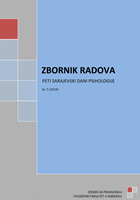Kognitivno-bihevioralni tretman posttraumatskog stresnog poremećaja – prikaz slučaja
Cognitive-behavioral treatment of posttraumatic stress disorder – case study
Author(s): Zana Imamović-SalčinovićSubject(s): Individual Psychology, Clinical psychology, Behaviorism, Health and medicine and law
Published by: Filozofski fakultet Univerziteta u Sarajevu
Keywords: cognitive-behavioral therapy; posttraumatic stress disorder; desensitization in imagination;
Summary/Abstract: The purpose of this paper is to show the cognitive-behavioral treatment of PTSD forty-one year old client, who had traumatic experience less than a month before coming to the therapy. She had car accident while she was on pedestrian crossing. She got neck, arm and leg injury. Her underage son was with her, fortunately he did not get any physical injuries because he managed to cross the street. The client only has partial memories of the events after the accident. The worst thing for her was that she could not see her son at the moment when car hit her, so she thought that he had been severely injured. Now, she feels intense fear, disturbance and discomfort, has severe headache, dizziness and sleeping issues. All of the above has resulted the inability to go out independently anywhere, she avoids the place where the accident occurred, she has everyday fear that her son will have a traffic accident and get hurt on his way from school. There is constant fear of streets, cars, pedestrian crossing and difficulties talking about the accident. Only picturing the place where the accident occurred causes anxious reactions and she has never passed that street again. The treatment included 14 sessions and involved behavioral interventions in order to reduce the general level of autonomic excitement: abdominal breathing exercises, distractions, visualization, desensitization in imagination, exposure of the accident site and other situations she is afraid of, and abolishing safe behaviors. Cognitive interventions in treatment was focused on reducing the client’s fear and processing of traumatic experience and included: psychoeducation, cognitive restructuring and statements for coping. CBT interventions have led to significant and visible changes in the client’s behavior and opinion that are reflected in improved overall functioning, reduced level of anxiety, decreased posttraumatic reactions. Exceptional client motivation significantly contributed to the successful processing of traumatic experience and going back to her previous everyday life. The significant of this paper is to show the efficiency of cognitive behavioral techniques and confirmation that CBT is effective treatment for PTSD.
Journal: SARAJEVSKI DANI PSIHOLOGIJE: ZBORNIK RADOVA
- Issue Year: 5/2019
- Issue No: 5
- Page Range: 115-124
- Page Count: 10
- Language: Bosnian

